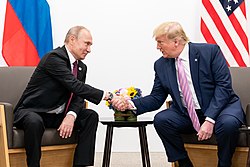
Back وسائل التواصل الاجتماعي في الانتخابات الرئاسية الأمريكية 2016 Arabic Social media in the 2016 United States presidential election SIMPLE 2016 Amerika Birleşik Devletleri başkanlık seçimlerinde sosyal medya Turkish
2016 U.S. presidential election | |
|---|---|
| Republican Party | |
| Democratic Party | |
| Third parties | |
| Related races | |
| |
| Trump–Russia relations |
|---|
 |
Social media played an important role in shaping the course of events surrounding the 2016 United States presidential election. It facilitated greater voter interaction with the political climate; unlike traditional media, social media gave people the ability to create, comment on, and share content related to the election.[1]
Many candidates extended their campaiging efforts onto a variety of social media platforms, including YouTube, Facebook, Twitter, Instagram, and Snapchat.[2] Depending on the digital architecture of each platform, candidates would use a variety of techniques to discredit their opponent, and gain support. In turn, users could share, like, or comment on these actions, furthering the candidates' outreach. By doing so, candidates and users both would influence or change people's views on a specific issue.[3]
Following the election, disclosures of widespread personal data misuse by Facebook and Cambridge Analytica for political advertising purposes were reported by The Guardian and The New York Times. In response, Facebook's CEO Mark Zuckerberg testified in front of Congress, and Facebook was fined $5 billion by the Federal Trade Commission for privacy violations. A separate investigation into the Russian interference in the election was also conducted, and concluded with the observation that Russian intelligence agencies had created fake accounts and spread misinformation on multiple social media sites in order to influence the election in favor of the eventual winner Donald Trump. This in turn prompted a debate over dissemination of fake news over the Internet, with many social media sites adopting new fact-checking policies for the 2020 election.[4][5]
- ^ Barthel, Michael (May 25, 2016). "How the 2016 presidential campaign is being discussed on Reddit". Pew Research Center. Retrieved April 5, 2021.
- ^ Sternberg, Josh (October 19, 2009). "How Local Politicians Are Using Social Media". Mashable. Archived from the original on April 13, 2017. Retrieved April 12, 2017.
- ^ "Social media causes some users to rethink their views on an issue". Pew Research Center. November 7, 2016. Archived from the original on April 12, 2017. Retrieved April 12, 2017.
- ^ Culliford, Elizabeth, Paul, Katie (May 30, 2020). "With fact-checks, Twitter takes on a new kind of task". Reuters. Archived from the original on August 17, 2020.
{{cite web}}: CS1 maint: multiple names: authors list (link) - ^ Hunt Allcott, Matthew Gentzkow (Spring 2017). "Social Media and Fake News in the 2016 Election" (PDF). Journal of Economic Perspectives. 31 (2): 211–236. doi:10.1257/jep.31.2.211. S2CID 32730475. Archived (PDF) from the original on October 18, 2017. Retrieved May 13, 2017.
© MMXXIII Rich X Search. We shall prevail. All rights reserved. Rich X Search